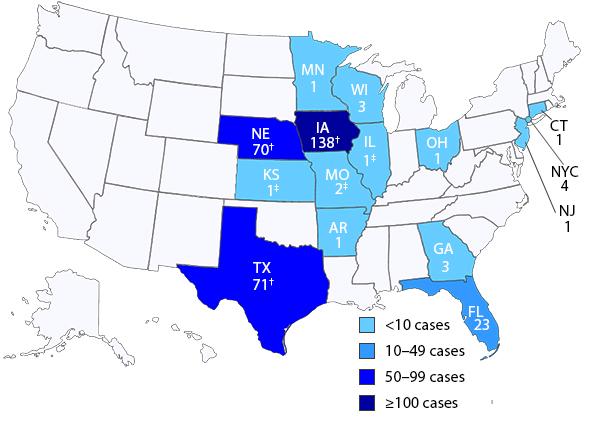Health And Fitness
Obesity Rate Declines Among Low-Income Iowa Preschoolers
News Release - Iowa is among 19 states and territories with decreases in obesity among low-income 2 to 4-year-olds, according to the latest Vital Signs report from the Centers for Disease Control and Prevention (CDC). Iowa’s obesity rate among this group has fallen nearly one percent from 15.1 percent in 2008 to 14.4 percent in 2011.The entire report may be found at www.
Another Diarrheal Illness Increases across Iowa
Cryptosporidiosis can be prevented by good hygiene
In recent weeks, the Iowa Department of Public Health (IDPH) has received a growing number of reports of Cryptosporidiosis, or ‘Crypto.’ Of the 358 cases of Crypto reported to IDPH so far this year, 272 cases have occurred since June 1. An additional 138 cases are currently under investigation.
Oven Canning- UNSAFE
Preserving food by canning in the oven has been a hot topic this summer. It seems everyone is looking for a shortcut to preserve food at home.
Oven canning is NOT a safe shortcut! Rachel Wall, Nutrition & Health Specialist and a registered dietitian for Iowa State University Extension and Outreach, says, “Home food preservers have heard of oven canning and are wondering if it is a safe method.
Antioxidant: Vitamin A
Vitamin A is an antioxidant. Antioxidants are substances that may protect your cells against the effects of free radicals. Free radicals are molecules produced when your body breaks down food, or by environmental exposures like tobacco smoke and radiation. Vitamin A also plays a role in your: Vision, Bone growth, Reproduction, Cell functions, and Immune system.
Red Cross blood drive set for Wednesday
Red Cross is sponsoring a blood drive today, Wednesday, August 7, from 1:30-6:00 p.m. at the Vinton Skate Center. Walk-ins are welcome. Special refreshments today are rootbeer floats. We hope to see you there.
Intro to Antioxidants
Introduction
Antioxidants are man-made or natural substances that may prevent or delay some types of cell damage. Diets high in vegetables and fruits, which are good sources of antioxidants, have been found to be healthy; however, research has not shown antioxidant supplements to be beneficial in preventing diseases. Examples of antioxidants include vitamins C and E, selenium, and carotenoids, such as beta-carotene, lycopene, lutein, and zeaxanthin.
U.S. breastfeeding rates continue to rise
U.S. breastfeeding rates continue to rise
Keeping moms and babies together during the hospital stay is important to progress
Breastfeeding rates have continued to rise over the past decade, according to data released today by the Centers for Disease Control and Prevention. The percent of babies breastfeeding at six months increased from 35 percent in 2000 to 49 percent in 2010.
Cyclospora Update: Source Identified
IDPH, CDC, Iowa Department of Inspections and Appeals, the State Hygienic Laboratory and local public health agencies are investigating an outbreak caused by Cyclospora.
The epidemiologic investigation completed by local public health departments in Iowa and IDPH has implicated a prepackaged salad mix as the source of the outbreak. The food trace back investigation performed by DIA determined that at least 80 percent of these cases had been exposed to the same prepackaged salad mix.
Ticks Likely Source for New Heartland Virus
What is a phlebovirus?
"Phlebovirus" is the name for a family of related viruses. Viruses in this family are found all over the world. Some of these viruses can cause people to get sick. Most of the phleboviruses that cause people to become ill are passed through the bite of a mosquito, tick, or sandfly. Recently, a new phlebovirus that causes illness in people was discovered in Missouri.
Investigation of an Outbreak of Cyclosporiasis in the US
 Updated by CDC: 7/26/13
On June 28, 2013, CDC was notified of 2 laboratory-confirmed cases of Cyclospora infection in Iowa residents who had become ill in June and did not have a history of international travel during the 14 days before the onset of illness. Since that date, CDC has been collaborating with public health officials in multiple states and the US Food and Drug Administration (FDA) to investigate an outbreak of cyclosporiasis.
Updated by CDC: 7/26/13
On June 28, 2013, CDC was notified of 2 laboratory-confirmed cases of Cyclospora infection in Iowa residents who had become ill in June and did not have a history of international travel during the 14 days before the onset of illness. Since that date, CDC has been collaborating with public health officials in multiple states and the US Food and Drug Administration (FDA) to investigate an outbreak of cyclosporiasis.